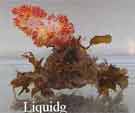Algae requirements for use in the marine aquarium.
South East Queensland Marine Aquarium and Ocean activities Forum :: SEQMAOAF :: Marine aquarium discusion.
Page 1 of 1
 Algae requirements for use in the marine aquarium.
Algae requirements for use in the marine aquarium.
There is no documentation on any of this,but some of you fellow aandtsociety folk have seen what my weird ways acheive.
Hey guys, just wanted to share a little of my additives I use for the aquariums algae, the most important part of the aquariums bio system for the end game, the toxins!
The algae aspect includes the algae with photosynthetic life forms,coral,anemones and so on.
You can not keep algae active and achieving a productive life with out some king of iodide additive!
This is very important for the long term affects upon algae.
Along with this substance I use, as a few of you know, algae killed with hot water and put into the system to releases its cellular make up, (what its made of) and has internally at the time of its demise, which is what ever it has been photosynthesised and converted into what!
Also a huge assistance to the corals algae clades with its cells and the standard algae like caulerpa with the marine eco system is local mud.
This is from a trusted low tide spot you can find at quite a few sites, not the actual mud that quickly settles to the bottom of a bucket, the mud that remains suspended for a few moments is best as it contains minimal heavy metals and similar!
From this comes benthic life forms as a planktonic sized food source,cyano the types that can be used as a food source,some organics and many forms of light elements that remain in suspension for a moment or two so the settling mud at the bottom of the bucket can be discarded easily.
All these methods are quite similar to land plant needs and there is no scientific notations on these uses for reef aquarium life, just common sense when handling plant life and the results speak for them selves, in this case marine plant life results.
What reef keepers don’t seem to realise is that biological activities convert different forms of organics regarded as waste into different forms of vitamins and other useful elements for corals and other photosynthetic life forms,horticulture 1 O 1,nature at its simplest.
This is my additive form of iodide, redsea products have a good name and from last year I moved from the seachem ways of adding iodine, which iodide becomes in salt water any way and I have found it an excellent extra addition to increase my algae health and its hard work that is obviously being carried out.

Hey guys, just wanted to share a little of my additives I use for the aquariums algae, the most important part of the aquariums bio system for the end game, the toxins!
The algae aspect includes the algae with photosynthetic life forms,coral,anemones and so on.
You can not keep algae active and achieving a productive life with out some king of iodide additive!
This is very important for the long term affects upon algae.
Along with this substance I use, as a few of you know, algae killed with hot water and put into the system to releases its cellular make up, (what its made of) and has internally at the time of its demise, which is what ever it has been photosynthesised and converted into what!
Also a huge assistance to the corals algae clades with its cells and the standard algae like caulerpa with the marine eco system is local mud.
This is from a trusted low tide spot you can find at quite a few sites, not the actual mud that quickly settles to the bottom of a bucket, the mud that remains suspended for a few moments is best as it contains minimal heavy metals and similar!
From this comes benthic life forms as a planktonic sized food source,cyano the types that can be used as a food source,some organics and many forms of light elements that remain in suspension for a moment or two so the settling mud at the bottom of the bucket can be discarded easily.
All these methods are quite similar to land plant needs and there is no scientific notations on these uses for reef aquarium life, just common sense when handling plant life and the results speak for them selves, in this case marine plant life results.
What reef keepers don’t seem to realise is that biological activities convert different forms of organics regarded as waste into different forms of vitamins and other useful elements for corals and other photosynthetic life forms,horticulture 1 O 1,nature at its simplest.
This is my additive form of iodide, redsea products have a good name and from last year I moved from the seachem ways of adding iodine, which iodide becomes in salt water any way and I have found it an excellent extra addition to increase my algae health and its hard work that is obviously being carried out.

_________________
Forum Admin

liquidg- Posts : 2782
Join date : 2010-02-02
Location : Brisbane bayside
 Similar topics
Similar topics» Delisea pulcha and Dictyota bartayresiana algae in the marine display aquarium.
» Pests-cyano,hair algae,mantis,white spot,velvet and more in the marine aquarium
» Parasites in the marine aquarium.
» Cycling a marine aquarium
» Algae in the display reef aquarium.
» Pests-cyano,hair algae,mantis,white spot,velvet and more in the marine aquarium
» Parasites in the marine aquarium.
» Cycling a marine aquarium
» Algae in the display reef aquarium.
South East Queensland Marine Aquarium and Ocean activities Forum :: SEQMAOAF :: Marine aquarium discusion.
Page 1 of 1
Permissions in this forum:
You cannot reply to topics in this forum
 Home
Home